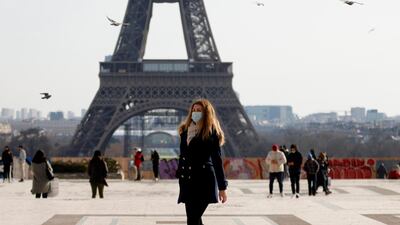Economic output in the Organisation for Economic Co-operation and Development area contracted 4.9 per cent in 2020, the largest drop since 1962 as gross domestic product slowed to 0.7 per cent in the fourth quarter.
The contraction follows a third quarter rebound when output surged 9 per cent as Covid-19 restrictions eased across the area, while the first half of the year saw sharp falls in GDP as the effects of the pandemic took hold.
“Following the unprecedented falls in the first half of 2020, due to Covid-19 containment measures, and the large rebound in the third quarter, growth of real GDP in the OECD area slowed to 0.7 per cent in the fourth quarter of 2020,” the OECD said.
Almost all countries suffered a fall in output in 2020, with declines ranging from 3.5 per cent in the US to 9.9 per cent in the UK, the OECD said.
Britain's economy was ravaged by the pandemic last year, with the economy suffering the biggest annual fall in output since modern records began. The country avoided heading back towards recession in the final quarter of the year by growing 1.2 per cent in December alone.
British Finance Minister Rishi Sunak needs tax rises of about £60 billion ($83.55bn) to ensure the government can balance the books following the Covid-19 crisis, according to the Institute for Fiscal Studies, after public sector borrowing soared to £34.1bn in December, taking government debt since the start of the financial year in April to a record £270.8bn.
France also experienced marked falls in output last year, with a contraction of 9.2 per cent while Italy’s output dropped by 8.9 per cent.
The International Monetary Fund expects the global economy to grow 5.5 per cent this year, 0.3 per cent more than the fund’s October estimate as vaccination programmes gather pace and the world’s largest economies provide additional support to strengthen economic activity in the latter part of the year.
It will follow a contraction in the world economy of 3.5 per cent, the IMF said in January’s update to its World Economic Outlook, after the pandemic paralysed the travel industry, disrupted trade, led to lockdowns across the world and increased unemployment and poverty.
GDP for the OECD's major seven economies slowed to 0.8 per cent in the fourth quarter with “quite divergent patterns".
While GDP growth remained positive in Japan at 3 per cent, Canada at 1.9 per cent and 1 per cent for both the US and UK, Germany recorded only 0.1 per cent growth in the last three months of the year and Italy and France suffered contractions of 2 per cent and minus 1.3 per cent respectively.
In the eurozone, GDP contracted 0.6 per cent in the fourth quarter following a rebound of 12.4 per cent in the previous three months.


